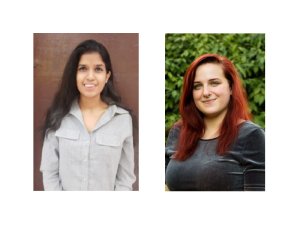Presented By: Department of Psychology
CCN Forum:
Shreya Rajagopal and Katy Michon, Graduate Students, Cognition and Cognitive Neuroscience

Shreya
Title:
Mapping Individual Trajectories of Structural and Cognitive Decline in Mild Cognitive Impairment
Abstract:
The US has an aging population. For the first time in US history, the number of older adults is projected to outnumber that of children by 2034. This combined with the fact that the prevalence of Alzheimer's Disease increases exponentially with age makes for a worrying combination. Mild cognitive impairment (MCI) is an intermediate stage of cognitive decline between being cognitively normal and having full-blown Dementia, with every third person with MCI progressing to dementia of the Alzheimer's Type (DAT). While there is no known way to reverse symptoms once they begin, early prediction of disease can help stall its progression and help with early financial planning. While grey matter volume loss in the Hippocampus and Entorhinal Cortex (EC) are characteristic biomarkers of DAT, little is known about the rates of decrease of these volumes within individuals in MCI state across time. We used longitudinal growth curve models to map individual trajectories of volume loss in subjects with MCI. We then looked at whether these rates of volume decrease could predict progression to DAT right in the MCI stage. Finally, we evaluated whether these rates of Hippocampal and EC volume loss were correlated with individual rates of decline of episodic memory, visuospatial ability, and executive function.
Katy
Title:
Using precision neuroimaging to densely map cognitive control
Abstract:
Most neuroimaging studies of brain function analyze data in normalized space to identify regions of common activation across participants. These studies treat interindividual differences in brain organization as noise, but this approach can obscure important information about the brain’s functional architecture. Recently, a number of studies have adopted a precision imaging approach that collects multiple hours of data from each participant to map brain function on a finer scale. However, these studies have most often used resting-state connectivity, and recent evidence suggests that the inclusion of multiple task states may provide better insight into the function of different brain areas. Using an extension of these recent methods that is both person-specific and dense, we created functional parcellations of individuals’ cognitive control areas. Upon examination of preliminary data, we find that these parcellations are individually unique and reliable, demonstrating this approach’s promise in furthering our understanding of the neural architecture underlying cognitive control.
Title:
Mapping Individual Trajectories of Structural and Cognitive Decline in Mild Cognitive Impairment
Abstract:
The US has an aging population. For the first time in US history, the number of older adults is projected to outnumber that of children by 2034. This combined with the fact that the prevalence of Alzheimer's Disease increases exponentially with age makes for a worrying combination. Mild cognitive impairment (MCI) is an intermediate stage of cognitive decline between being cognitively normal and having full-blown Dementia, with every third person with MCI progressing to dementia of the Alzheimer's Type (DAT). While there is no known way to reverse symptoms once they begin, early prediction of disease can help stall its progression and help with early financial planning. While grey matter volume loss in the Hippocampus and Entorhinal Cortex (EC) are characteristic biomarkers of DAT, little is known about the rates of decrease of these volumes within individuals in MCI state across time. We used longitudinal growth curve models to map individual trajectories of volume loss in subjects with MCI. We then looked at whether these rates of volume decrease could predict progression to DAT right in the MCI stage. Finally, we evaluated whether these rates of Hippocampal and EC volume loss were correlated with individual rates of decline of episodic memory, visuospatial ability, and executive function.
Katy
Title:
Using precision neuroimaging to densely map cognitive control
Abstract:
Most neuroimaging studies of brain function analyze data in normalized space to identify regions of common activation across participants. These studies treat interindividual differences in brain organization as noise, but this approach can obscure important information about the brain’s functional architecture. Recently, a number of studies have adopted a precision imaging approach that collects multiple hours of data from each participant to map brain function on a finer scale. However, these studies have most often used resting-state connectivity, and recent evidence suggests that the inclusion of multiple task states may provide better insight into the function of different brain areas. Using an extension of these recent methods that is both person-specific and dense, we created functional parcellations of individuals’ cognitive control areas. Upon examination of preliminary data, we find that these parcellations are individually unique and reliable, demonstrating this approach’s promise in furthering our understanding of the neural architecture underlying cognitive control.